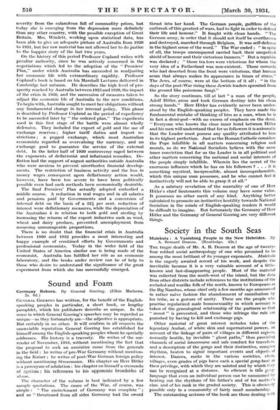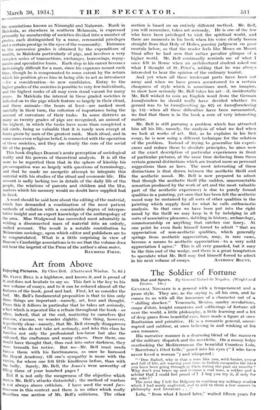Society m the South Seas
Malekula : A Vanishing People in the New Hebrides. By A. Bernard Deacon. (Routledge. 42s.) THE tragic death of Mr. A. B. Deacon at the age of twenty- four robbed social anthropology of one who promised to be among the most brilliant of its younger exponents. Malekula is the eagerly awaited record of his work, and despite the inevitable lacunae it is a very valuable account of a little- known and fast-disappearing people. Most of the material was collected from the south-west of the island, but the data from other districts include references to the institutions of the secluded and warlike folk of the north, known to Europeans as the Big Nambas, whose chief only a few months ago announced in rather naive fashion the abandonment of cannibalism by his tribe, as a gesture of amity. These are the people who practise regularized male homosexuality in which account is taken of the genealogical relationship of the partners so that " incest " is prevented, and those who infringe the rule are punished by having to kill and exchange pigs.
Other material of great interest includes tales of the legendary Ambat, of white skin and supernatural powers, an account of the linkage of pairs of villages in different regions, normally hostile, by invisible " ghost paths," thus providing channels of social intercourse and safe conduct for travellers, and a description of the gongs and their distinctive, complex rhythms, beaten to signal important events and objects Of interest. Dances, ranks in the various societies, clans, villages, even grades of pigs have each a special gong-beat as their privilege, with which they are saluted and by which they can be recognized at a distance. So efficient is this gong- language that even an individual person can be summoned by beating out the rhythms of his father's and of his mother's clan. and of his rank in the graded society. This is obviously possible only in a community of fairly small membership.
The outstanding sections of the book are those dealing with
the associations known as Nimangki and Nalawan. Rank in Malekula, as elsewhere in southern Melanesia, is expressed primarily by membership of societies divided into a number of grades, each distinguished by a name, ceremonial privileges and a certain prestige in the eyes of the community. Entrance to the successive grades is obtained by the expenditure of wealth, in Malekula particularly of pigs, and involves a very complex series of transactions, exchanges, borrowings, repay- ments and speculative loans. Each step in his career becomes increasingly difficult for a man, since his expenses mount each time, though he is compensated to some extent by the return which his position gives him in being able to act as introducer —for a consideration—to new candidates. Entry to the higher grades of the societies is possible to very few individuals, and the highest ranks of all may even stand vacant for many years. In Malekula the interest in these graded societies is reflected on to the pigs which feature so largely in their ritual, and these animals—the boars at least—are ranked most carefully in their turn, the criterion of importance being the amount of curvature of their tusks. In some districts as many as twenty grades of pigs are recognized, an animal of the highest, in which the tusks have more than completed a full circle, being so valuable that it is rarely seen except at feasts given by men of the greatest rank. Much ritual, and in some cases even religious belief, is connected with the operation of these societies, and they are clearly the core of the social life of the people.
This book displays Deacon's acute perception of sociological reality and his powers of theoretical analysis. It is all the more to be regretted then that in the sphere of kinship his pre-occupation was so largely with questions of terminology, and that he made no energetic attempt to integrate this material with his studies of the ritual and economic life. His account is sadly lacking too in details of the daily life of the people, the relations of parents and children and the like, matters which his memory would no doubt have supplied had he lived.
A word should be said here about the editing of the material, which has demanded a combination of the most patient methods of collation with a considerable degree of interpre- tative insight and an expert knowledge of the anthropology of the area. Miss Wedgwood has succeeded most admirably in welding a disconnected mass of material into an orderly, unified account. The result is a notable contribution to Melanesian sociology, upon which editor and publishers are to be congratulated. What is a little surprising in view of Deacon's Cambridge associations is to see that the volume does not bear the imprint of the Press of the author's alma mater.
RAYMOND FIRTH.









































 Previous page
Previous page